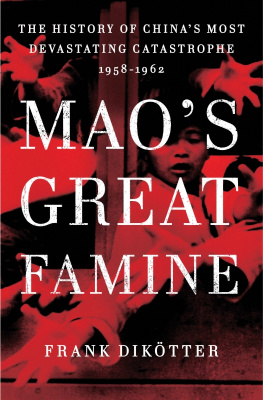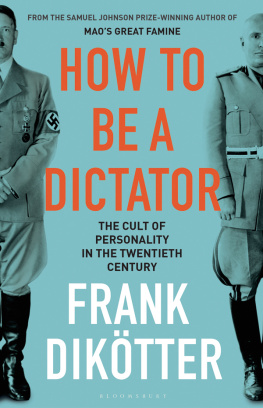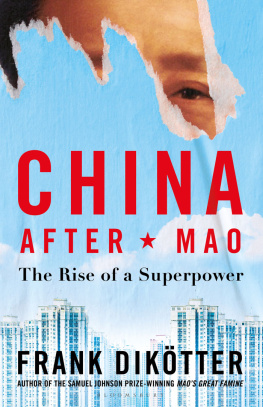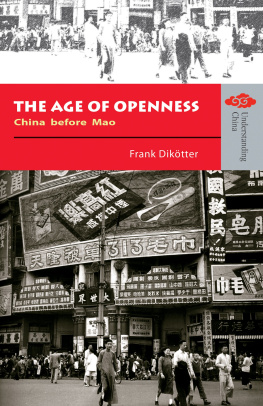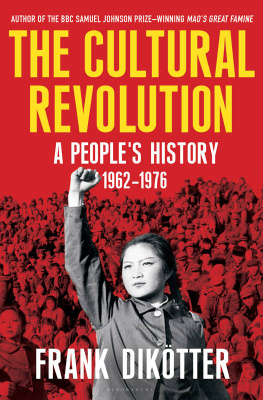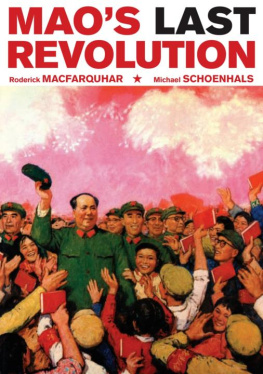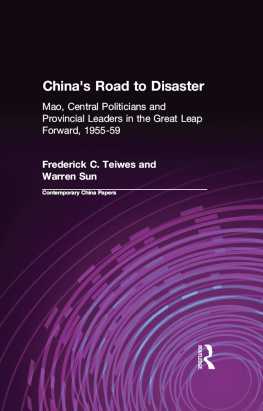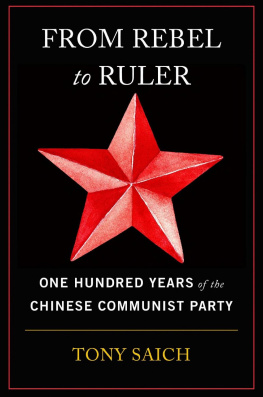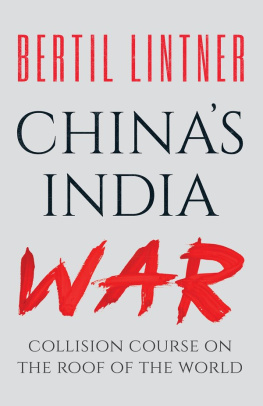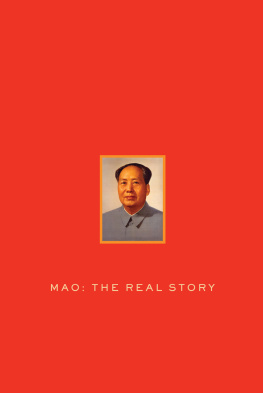I acknowledge with gratitude a Hsu Long Sing Research Grant from the Faculty of Arts, University of Hong Kong, research grant HKU743308H from the Research Grants Council, Hong Kong, and research grant RG016-P-07 from the Chiang Ching-kuo Foundation, Taiwan, which allowed me to carry out the research for this book. A number of people have read and commented on draft versions, in particular Brge Bakken, Jasper Becker, John Burns, Gail Burrowes, Chen Jian, Thomas DuBois, Louise Edwards, May Holdsworth, Christopher Hutton, Franoise Koolen, Kam Louie, Roderick MacFarquhar, Veronica Pearson, Robert Peckham, Arthur Waldron, Felix Wemheuer and Zhou Xun. Jean Hung, at the Universities Service Centre for China Studies at the Chinese University of Hong Kong, was very helpful. Michael Share, Jean-Franois Fayet and Elena Osokina helped me in gaining access to the archives in Moscow. Tammy Ho and Chan Yeeshan collected interviews from famine survivors in 2006. I owe a very special debt of gratitude to Zhou Xun, who not only enormously broadened the scope of the interviews on many a trip to the mainland, but also conducted additional research for me on several chapters. The Faculty of Arts at the University of Hong Kong, in particular the Department of History, has been a wonderful environment for the research, and I am grateful to all my colleagues who supported the project, in particular Daniel Chua, Peter Cunich, Maureen Sabine and Kam Louie.
There are many people in mainland China who helped my research in one way or another, but I prefer not to name them for reasons that seem obvious enough. I very much hope that the situation will be different one day. I am indebted to my publishers, namely Michael Fishwick in London and George Gibson in New York, and my copy-editor Peter James, as well as Anna Simpson, Alexa von Hirschberg and all the team at Bloomsbury. I would like to convey my deep gratitude to my literary agent Gillon Aitken, who had faith in me and the project from the very beginning. Last but not least, I wish lovingly to thank my wife Gail Burrowes.
Hong Kong, February 2010
The bulk of the sources come from party archives in China, and a few words about these may help the reader better to understand the foundation on which the book rests. In a one-party state, archives do not belong to the public, they belong to the party. They are often housed in a special building on the local party committee premises, which are generally set among lush and lovingly manicured grounds closely guarded by military personnel. Access to the archives is strictly regulated and would have been unthinkable until a decade or so ago, but over the past few years increasing quantities of documents older than thirty years have become available for consultation to readers with a letter of recommendation. The extent and quality of the material vary from place to place, but in general most collections distinguish between open, or declassified, and closed, or controlled files, as truly sensitive material remains out of bounds except to the eyes of the most senior party members. The very fact that this distinction removes from the scrutiny of most historians a large proportion of vital information indicates that this book has been written with relatively soft material: future historians, hopefully, will be able to reveal the true scale of what happened on the basis of fully open archives.
Another complication presents itself in the fact that, with the exception of the Ministry of Foreign Affairs, most central archives are extremely difficult to access. Most historians tend to rely on provincial and county collections instead. Although a good dozen city and county archives have been used in this work, the majority of the material comes from ten provincial archives (listed in the Select Bibliography), which were chosen largely on the basis of openness. Until now no historian, to my knowledge, has been able to work on the Maoist era in the Anhui provincial archives, while the collection in Henan also remains highly restricted, to the point where even if access were granted it would remain rather meaningless, as only the most banal documents would be handed over to the researcher, often in painfully small quantities. Other collections, by contrast, have been gradually opening up, and my selection represents a good spread of provinces in terms of population density (Shandong versus Gansu), severity of the famine (Sichuan on one extreme, Zhejiang on the other) and geography (from Hebei in the north to Guangdong in the south).
The archives inside each provincial collection reflect the structure of the party machinery and are often divided into smaller groups according to the institution they belonged to for instance the Bureau for Hygiene or the Bureau for Forestry. What the historian finds, then, is often extremely diverse material, far more so than the stark term archives actually suggests. There are letters written by ordinary people, surveys of working conditions in factories by the All-China Federation of Trade Unions, investigations into cases of corruption, Bureau of Public Security reports of theft, murder, arson and assault on granaries, detailed evidence of local cadre abuses compiled by special teams sent in during rectification campaigns, general reports on peasant resistance during the collectivisation campaign, secret opinion surveys and much more.
The huge variety of material is nonetheless of official provenance. Even the letters written by ordinary farmers and workers would have been selected for some official purpose, and we have little alternative but to view everyday life through the prism of the state. This observation, of course, is true for all state archives, including those of Hitlers Germany and Stalins Russia. It does not mean that we cannot read them against the grain. Finally, any historian worth his salt will know how to assess the authorship of official reports, their intended audience, the institutional context which engendered them and the conditions of their production. Historians are attuned to the complications which result from the distortion of social reality by official rhetoric, as terms such as sabotage, slacking, treason, enemy of the people and leftist excesses obscure what happened. Yet the sheer variety and abundance of reports about resistance demonstrate the persistence of rural strategies of survival, while the state itself was a complex, sprawling organisation which hardly ever spoke or reported with one voice. Just as senior leaders such as Peng Dehuai and Mao Zedong clashed in their findings about the Great Leap Forward, different individuals, units and organisations varied enormously in how they reported what they found on the ground.
Provincial archives are not only much richer than the smaller collections which can be found in counties, cities or even villages, but they also tend to keep copies of important files that were sent to them from above, namely Beijing, or from below, for instance when counties reported on important matters such as grain shortages or the collapse of a dam. In the bureaucratic maze of communist China, a document was hardly ever unique, in the sense that copies were made and circulated to many institutions who might have claimed a stake in the case at hand. Many of the reports compiled by work teams, for instance, would have been sent to several dozen party members. An important central document was distributed to every province and county, while more sensitive material might have been copied only to the first secretaries of each province. In other words, a wealth of material which does not necessarily pertain to the region in question can be found in provincial collections, including minutes of speeches and gatherings at the highest level. These minutes can vary considerably, as they were taken by different people, sometimes from tape recordings. Some are more detailed than others. I have tried to make it as easy as possible for the interested reader to find out the provenance of each document. In the Notes the first number in the archival location data refers to the general collection, the name of which is provided in the list of archives at the end of this book. As an example, Hunan, 6 Oct. 1962, 207-1-750, pp. 449 indicates that the document is contained in a file from the Hunan provincial archives in collection 207, which stands for the Bureau for Water Conservancy and Hydroelectricity.
Next page
